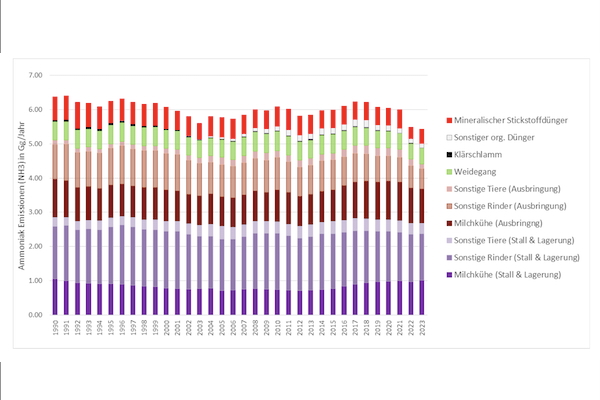 Development of agricultural ammonia emissions in Luxembourg from 1990-2023, overall and broken down according to source areas (in Gg ammonia per year);
Credit: MA
Development of agricultural ammonia emissions in Luxembourg from 1990-2023, overall and broken down according to source areas (in Gg ammonia per year);
Credit: MA
On Monday 5 May 2025, Luxembourg’s Ministry of Agriculture, Food and Viticulture held a press conference at the Aloyse and Robert Marx farm in Garnich, where it presented the progress of the work and the solutions developed by the Ammonia Task Force.
The Ammonia Task Force, a collaboration between the Ministry of Agriculture, Food and Viticulture and representatives of the agricultural sector (CONVIS, Chamber of Agriculture, Lycée Technique Agricole), was established to reduce Luxembourg’s agricultural ammonia emissions and is regarded by the ministry as essential in meeting European commitments and ensuring a prosperous future for Luxembourg’s agriculture sector.
As reported by the ministry, in 2023, Luxembourg recorded total national ammonia (NH₃) emissions of 5.7 Gg. Over 95% of these emissions came from the following agricultural sources: animal husbandry (housing, storage of manure); agricultural soils (application of manure, mineral fertilisers, sewage sludge, other organic fertilisers and grazing).
The Luxembourg agricultural sector has committed itself to tackle the challenges related to reducing ammonia emissions and, according to the ministry, has already reduced its agricultural production emissions by nearly 11%. This is regarded as a significant result, but the task force acknowledged that there is still work to be done to meet the national target of a 22% reduction by 2030.
When referencing historic data across the period from 1990 to 2023, the ministry noted that during the period of 2021 to 2022 there was a significant decrease in ammonia levels in Luxembourg, reflecting a drop in the use of mineral fertilisers and the increased adoption of environmentally friendly slurry spreading techniques. Fertiliser use in the Grand Duchy also fell sharply in 2022, as prices for agricultural products - particularly synthetic fertilisers - rose due to Russia’s invasion of Ukraine. Emissions in 2023 remained at similar levels, showing a stabilisation of the decline.
Luxembourg’s Minister of Agriculture, Food and Viticulture, Martine Hansen, explained: "Many advances have already been made but the road ahead is still long. Together with the sector, we will continue to look for effective and realistic solutions to meet the targets. This is a priority to ensure the sustainability of Luxembourg’s agriculture.”
The Ammonia Task Force reported several key areas where action can be taken:
⁃ optimisation of animal feed: adjust protein inputs to limit excess nitrogen in manure;
⁃ improvement of herd management: adapt breeding practices (renewal, animal health) to better control nitrogen flows at the herd level;
⁃ optimisation of mineral fertilisation: favour less emissive fertilisers;
⁃ extension of grazing periods: keep cows grazing for longer to reduce emissions associated with confinement in stables;
⁃ improvement of management in livestock buildings: limit contaminated surfaces, reduce the time manure and urine are in contact to lower emissions;
⁃ optimisation of manure storage: install covers on slurry pits and improve storage practices;
⁃ use of modern spreading techniques: adopt methods that significantly reduce ammonia losses during the application of manure on fields.
The report noted that techniques such as dried hay production (“Heutrocknungsanlage”) are being promoted. These help to produce protein-rich fodder while promoting a more autonomous system.
Farmer and president of the Convis advisory department, Nico Antony, and farmer and member of the plenary assembly of the Chamber of Agriculture, Louis Boonen, stressed the importance of tailoring solutions to each farm. Louis Boonen emphasised: “There is no one-size-fits-all solution. Every farm has its own specifics and must define its own actions based on its realities.” Nico Antony highlighted the importance of technical follow-up and stated: "It is crucial that each farm has an accurate nitrogen balance. Only by identifying the specific levers for each farm can targeted and effective measures be implemented." Louis Boonen added: "Every farmer will need to contribute. The sector must remain united to achieve our goals together."
Moreover, Minister Hansen said: "Reducing ammonia emissions is essential to meet European commitments and ensure a prosperous future for our agriculture. The collaborative approach of the Task Force is a model for successfully achieving this transition.”
The ministry announced that to support farmers, two information evenings have been scheduled: Tuesday 20 May 2025 at 20:00 in Berdorf; Wednesday 11 June 2025 at 20:00 in Hamiville.








